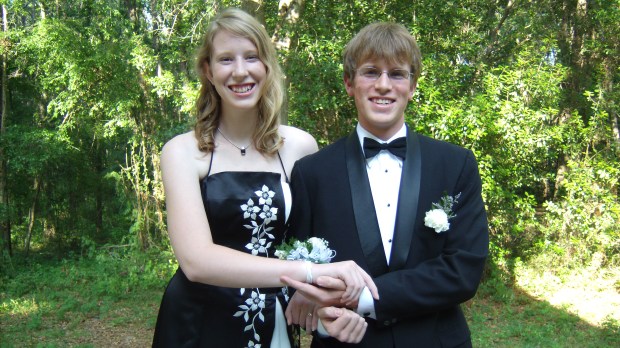Good Friday will never be just another day for Conor McBride – or for a number of people close to him. It is a day on which an action he carried out the previous Sunday – pulling the trigger of a shotgun – culminated in the death of his fiancée, Ann Grosmaire.
It’s been observed that the most solemn day on the Christian calendar, commemorating Christ’s death on the cross, is oddly named. But for Christians, there’s an obvious answer to the question, “How could such a violent, unjust death be called good?”
So too, the death of Ann Grosmaire, 19, on Good Friday in 2010, brought those who loved her, including Conor McBride, down to the depths of the Passion, the Agony in the Garden, the despair of someone crying out, “My God, why have you abandoned me?”
But Christ, while hanging on the cross, also prayed, “Father, forgive them, for they know not what they do.”
When Kate Grosmaire, Ann’s mother, met with Conor McBride in jail on Good Friday and told him that she and her husband, Deacon Andy Grosmaire, “love you and forgive you,” it hit the 19-year-old inmate like the lightning that struck Calvary on the first Good Friday. And it began the road to his rising from sin and death.
Conor had met Ann three years earlier in chemistry class at Leon High School in Tallahassee, Florida. Their dating eventually got serious enough that they planned to get married, and Ann expressed the hope of having children.
But Conor, according to his parents, Julie and Michael McBride, was an angry teenager. The young couple (pictured above in 2009) had frequent arguments, and the one that broke out over Palm Sunday weekend 2010 lasted several days — in person, over the phone, and through text messages.
At one point, as she stormed away, Ann told Conor, “I just want you to die.” Feeling helpless, frustrated and angry, he went to get his father’s shotgun, apparently to fulfill her wishes. But she returned, and the fight intensified. He felt helpless to resolve the discord between them and pointed the loaded weapon at her, thinking that scaring her would lead to a breakthrough. She begged him on her knees not to shoot. But he did, penetrating her right eye with the blast.
Conor proceeded to the police department to turn himself in. Ann was taken to hospital, where she was in grave condition. Conor’s father, Michael McBride, rushed back to Tallahassee from a trip to Panama City, and went to the hospital, even before going to see Conor. The Grosmaires and McBrides did not know each other very well, in spite of the fact that their children were dating, but when McBride arrived, Andy Grosmaire instinctively went up to him to embrace him.
Forgiveness and peace
In prayer, the Grosmaires discerned that Ann wanted them to forgive her shooter, that she wanted them to have peace in their hearts.
“When I prayed about what Ann wanted for us, the answer always came back that Ann wanted peace for us,” Kate said in an interview this week, as she looked back on the events of Holy Week 12 years ago. “I thank God every day that I knew about forgiveness going into this. It wasn’t a new concept for me. I’m a Franciscan, and I just really worked a lot on forgiving people. And I’m just really so glad that God had me in that place. Because when the answer of Ann wanting peace for us came to me, I knew that peace came through forgiveness. I knew that if I wanted to have peace, I would have to forgive Conor. I also knew how to get there, and I knew what I needed to do.”
For parents of a murdered child, the death is only the beginning of a long Lent, a long Holy Week, reliving the violence through a protracted prosecution. Admittedly, it was not easy for the Grosmaires, who have two other daughters, or the McBrides, who have a special needs child. But something was different here: the Grosmaire family told the prosecutor they would like to take a restorative justice approach, which Andy had heard about from an Episcopal chaplain in Florida’s prison system. The approach puts more emphasis on how an offender might make amends for the harm he caused.
The McBrides liked the idea and contacted Howard Zehr, a professor at Eastern Mennonite University, and Sujatha Baliga, an expert in restorative justice.
Zehr, known as the “grandfather of restorative justice,” wrote on the website of the Zehr Institute for Restorative Justice: “Recognizing that punishment is often ineffective, restorative justice aims at helping offenders to recognize the harm they have caused and encouraging them to repair the harm, to the extent it is possible. Rather than obsessing about whether offenders get what they deserve, restorative justice focuses on repairing the harm of crime and engaging individuals and community members in the process.”
Advocates believe restorative justice can help transform the American justice system, which, they say, often leaves no space for the voice of victims.
“It’s an approach to harm and violence and crime that focuses on who has been harmed, what are the needs of the victim, survivor or anyone impacted, how can you make things right, how can you make amends?” Krisanne Vaillancourt Murphy, executive director of the Catholic Mobilizing Network, said in an interview.
Reluctant to try a new approach
Baliga was reluctant to get involved at first, recognizing that restorative justice had never been tried in a murder case, and that Florida’s tough law-and-order reputation would doom the project.
“She called me to say no,” Julie McBride said in an interview this week.
“And then she found out that we were talking,” Michael added.
Baliga was impressed that the parents of the victim and the parents of the shooter were even communicating with each other. Kate Grosmaire explained that her husband “felt a very deep connection with Michael, because he recognized immediately – working with the Holy Spirit – that Michael lost his child.
“The minute Conor went to jail, he lost him,” Kate said. “So they had a connection from the very beginning.”
The two men began meeting for weekly lunches just months after the murder.
The prosecutor, Jack Campbell, who is now the Tallahassee State Attorney, also was hesitant to accept the restorative justice procedure, but was eventually persuaded. The initial meeting in the jailhouse, more than a year after the murder, included Conor, his parents, Ann’s parents, and Fr. Mike Foley, the Grosmaires’ pastor. Also present were Campbell and Conor’s lawyer. Baliga led the proceedings. A 2013 New York Times article described the scene:
Kate described nursing Ann. She told of how Ann had a “lazy eye” and wore a patch as a little girl. “We worked for her to have good vision so she could drive and do all these things when she grew up. It’s another thing that’s lost with her death: You worked so hard to send her off into the world — what was the purpose of that now?”
“She did not spare [Conor] in any way the cost of what he did,” Baliga remembers. “There were no kid gloves, none. It was really, really tough. Way tougher than anything a judge could say.” …
Conor was no less affected. “Hearing the pain in their voices and what my actions had done really opened my eyes to what I’ve caused,” Conor [said] later. “Then they were like, ‘All right, Conor, it’s on you.’ And I had to give an account of what I did.” He leaned forward, placed his elbows on his knees and looked directly at the Grosmaires, who were seated opposite him. It was difficult to get started, but once he did the story came out of him in one long flow.
“The good works of two people”
As the McBrides looked back at that crucial meeting, Michael told Aleteia, “Being able to sit down in the restorative justice circle with Kate and Andy and Fr. Mike and his parents, to be able to talk through what happened, to tell the actions, and then hear the enormity those actions had on people in the room really sort of rebooted [Conor]. And because of that he’s been able to move forward in a positive way. And that has allowed him to understand the impact of what he did but also understand that he is still able to move forward.”
Kate spoke to Conor toward the end of the session, telling him that he would now have to do the good works of two people, since her daughter was no longer there to do hers. She and Andy were able to suggest a prison term. At the end of the trial that followed, Conor received a 20-year prison sentence, which he is still serving.
By all accounts, Conor has been striving to satisfy Kate’s demand. In prison, he’s earned a paralegal certification and became a Department of Corrections law clerk, working on inmates’ cases. He’s earned an associate’s degree and is taking an Ohio University correspondence course for a bachelor’s.
“What he really enjoys doing is he’s thrown himself into teaching others,” said his mother, Julie. “He’s teaching a course on trauma recovery within prison and on victim awareness.”
One of the conditions for probation was to speak about teen dating violence, and he’s made a public service announcement about that, Kate said.
“I think he’s very concerned and directed into understanding what happened, why it happened, what he can do to improve himself,” she said.
He’s also gone from being a “None” to a believer. As he detailed it in an email to Aleteia, facilitated by his parents, as a child he attended a Baptist church with his grandparents. “But, honestly, I didn’t believe in any of it. I just went for the doughnuts,” he said. “As I entered my teen years, I questioned organized religion, especially blatant hypocrisy. I was very skeptical, even cynical about religion. Being an analytical, nerdy type, I want proof of God. I could believe in a grand creator. The universe is too wonderfully diverse and miraculously balanced to be made by random chance.”
But, he said, he didn’t believe in “the God of the Bible” but “more just a nebulous cosmic force.”
“When I was dating Ann, I attended Mass with her, and later RCIA,” he went on. “But it was more to make her happy than any real quest to get closer to God on my part.”
Turning point
The turning point, according to his email, was Ann’s parents’ response to the murder of their daughter.
“After I shot Ann, her parents decided to forgive me,” Conor wrote. “Who does that? Normal people do not forgive the man who shot and killed their daughter. They should want me dead. Yet, the Grosmaires chose to forgive. I honestly believe that was the love of God shining through them. I realized that they knew something, had something, that was real. That started my inquiry into Catholicism. Over the years, my faith journey has had its ups and downs. Still, for me, the Grosmaires’ forgiveness was the proof I needed. It is one thing to hear people say that God forgives you; it is quite another to experience it.”
He took instruction from a local priest and was confirmed in prison.
“He came to believe in God because of our forgiveness,” Kate told Aleteia. “He said because we forgave him he couldn’t blame us for his situation. So he was kind of forced in a way to say. ‘Well, if it’s not their fault, I have to look at what my responsibility is with all of this.’ He really has taken that opportunity to look at his life, figure out what went wrong.”
“The Grosmaires’ and the McBrides’ case is such an exceptional story, and it really is a testament to our human capacity for compassion and resilience and for moving from revenge toward reestablishing right relationships,” said Catholic Mobilizing Network’s Krisanne Vaillancourt Murphy. “We find that people who have suffered a harm or a tragedy, they think that if they forgive, it will mean that we are forgetting and that if they forget, how are they honoring the person who was lost? But it’s not the case. Forgiveness is really about remembering in a different way; it’s not forgetting. Or [people think] that somehow if you move toward forgiveness you’re not really seeking justice. And frankly those things are separate. They’re not the same thing. You can still pursue accountability and pursue justice and forgive.”
Kate emphasized that forgiveness is not a pardon. “People think ‘If I forgive you it means what you did is okay.’ And that’s not true at all.” Rather, it means that the offender owes a debt that the offended is never going to collect on. “We would wait forever,” she said. “There’s no way Conor could ever pay us back” for their loss of Ann.
Nor do any of the parties in this case believe that the restorative justice approach is “soft on crime.”
“Conor has always said that it’s the hardest thing he’s ever done,” his mother said. “And he’s living in a men’s prison.”
In his email, Conor said that a person cannot change “unless they accept that they made the choices that brought them to their worst decisions.”
“Restorative justice put me face to face with the harm I caused,” he wrote. “Hearing how my actions harmed the Grosmaires helped me understand their pain, to the extent I could. It made me search for the ‘why’ of my crime, because that is what the Grosmaires wanted to know. If it wasn’t for the preliminary work and then the Restorative Justice Victim/Offender dialogue, I do not know when or to what extent I would have looked at that. Restorative Justice made me face myself.”



